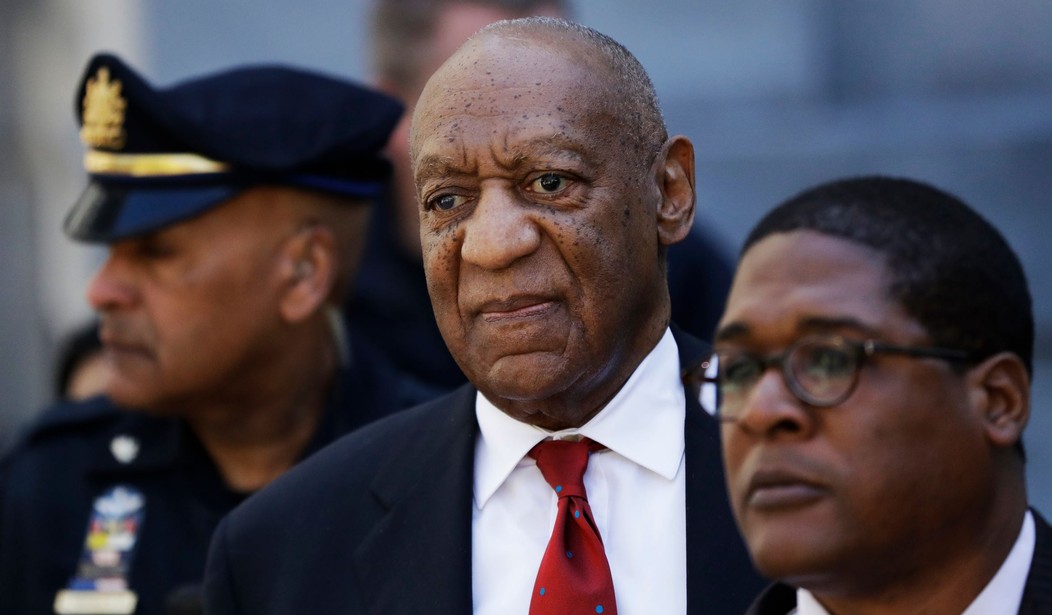Did the Supreme Court decide that it had no particular constitutional interest in the case of Bill Cosby’s prosecution for serial rape? Or did they just decide that they have enough controversy to last them in this term? The court denied cert to Cosby’s prosecutors in their attempt to reinstate his conviction, apparently bringing the criminal case against the former king of prime time to an end:
The Supreme Court on Monday turned away a request from Pennsylvania prosecutors to review a state supreme court decision that overturned Bill Cosby’s sexual assault conviction, leaving the ruling from Pennsylvania’s high court that freed him from prison intact.
Prosecutors from Montgomery County, Pennsylvania, asked the justices to wade into the case involving Cosby in November and argued the June decision from the state supreme court sets a “dangerous precedent” that is in tension with federal and state cases. The nation’s highest court, though, spurned their bid to reinstate Cosby’s conviction and, as is usual, did not explain its decision not to hear the case.
This is particularly interesting, given the composition of the court. It takes four justices to grant cert, and only one to write a dissent when such an application fails. Not one of the current justices bothered to even clear their throat on this denial of cert, not even with a generic “Justice So-and-So would have granted cert in this case” note appended to the decision. Instead, Pennsylvania v Cosby just got listed on a list of denied appeals in today’s orders.
That may be because the constitutional issues leaned in the other direction, to the extent this raises constitutional issues at all:
The decision from the Pennsylvania Supreme Court to toss out Cosby’s 2018 sexual assault conviction turned on a press release issued more than a decade earlier by Bruce Castor, who was then serving as the Montgomery County district attorney. Castor was in charge of investigating the criminal complaint against Cosby made by Andrea Constand, a former employee at Temple University who said Cosby sexually assaulted her at his home in 2004.
In the press release, Castor said he decided not to prosecute Cosby, as “under the circumstances of this case,” a conviction would be “unattainable.”
Having waived the potential of criminal prosecution, Castor then forced Cosby into civil actions which required his participation in depositions under the understanding that he faced no potential for criminal self-incrimination. Otherwise, Cosby would have defaulted on the civil actions. Castor’s successor then used those depositions to build a criminal case anyway, and Cosby’s statements in the depositions led directly to his convictions.
Cosby’s attorneys successfully argued at the Pennsylvania state supreme court that the Montgomery County District Attorney’s office played a “bait and switch” game with Cosby’s Fifth Amendment rights:
“Mr. Cosby’s Constitutional Rights were a ‘reprehensible bait and switch’ by Kevin Steele, Judge Steve T. O’Neill and their cohorts,” Wyatt said. “This is truly a victory for Mr. Cosby but it shows that cheating will never get you far in life and the corruption that lies within Montgomery County District’s Attorney Office has been brought to the center stage of the world.”
The Montgomery County DA’s office appealed on the basis of the 14th Amendment instead. That apparently missed the mark:
“The question presented to the Court is: ‘Where a prosecutor publicly announces that he will not file criminal charges based on lack of evidence, does the Due Process Clause of the Fourteenth Amendment transform that announcement into a binding promise that no charges will ever be filed, a promise that the target may rely on as if it were a grant of immunity?'” the release states.
As the decision stands now, it could have “far-reaching negative consequences” across the country, District Attorney Kevin Steele said in a statement.
The question wasn’t really the pledge itself. Prosecutors drop cases routinely if they feel less than confident in getting beyond reasonable doubt only to take them up later when better evidence emerges. Even a press release stating that they will not pursue criminal charges would not be binding in that sense. However, relying on that pledge to force a target into civil depositions and then using those depositions to pursue criminal charges amounts to an end-run around the Fifth Amendment. (It doesn’t negate how stupid Cosby was to fall for that scheme, though; he would have been smarter to default, and he lost anyway.)
In the end, that leaves us with a bad outcome that is nonetheless just in a very narrow sense. Cosby appears to be a despicable human being, and the prosecutors who pursued him also appear to have acted unethically. About the only people involved in this who acted entirely in good faith are the victims and the jurors, both of whom ended up getting run over in this exercise. The only good that will come out of this will be the message that courts will not tolerate end-runs around the right against self-incrimination — a good outcome for the rest of us, but one that stinks like yesterday’s garbage for Cosby’s victims.








Join the conversation as a VIP Member